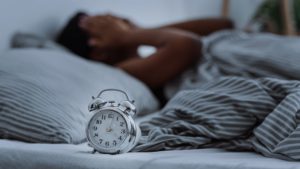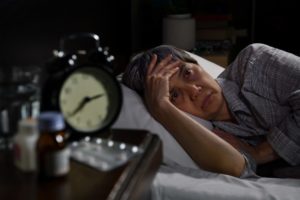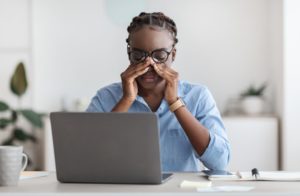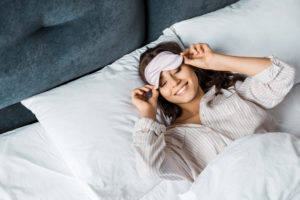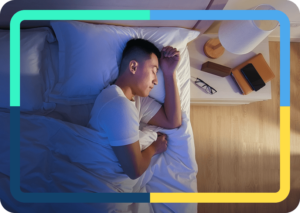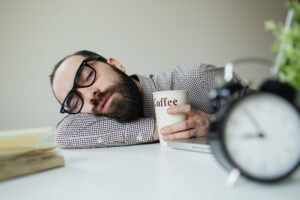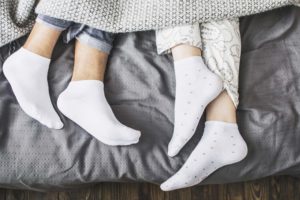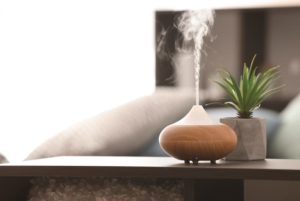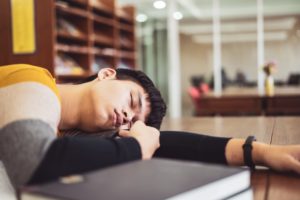When you buy through our links, we may earn a commission. Products or services may be offered by an affiliated entity. Learn more.
The Link Between Sleep and Job Performance
In addition to a workday that averages 9.5 hours, research has found that Americans are spending extra hours working from home each week, with sleep time reduced during workdays. While work schedules and stress can affect sleep, the opposite is true as well. Sleep deprivation can leave you feeling tired, less creative, and make it more difficult to stay focused on important projects.
Sacrificing sleep for work, then working more to make up for lost productivity, can become an exhausting cycle. Understanding the links between sleep and job performance can empower people with the knowledge needed to end this pattern.
How Can Sleep Affect Work?
Sleep supports nearly every system in the body . When we fall asleep, our eyes close, our breathing slows, and our muscles gradually relax. Neurons in the brain switch to a sleeping state , beginning many biological processes that refresh our body and mind. The rejuvenation provided by sleep is vital for our cardiovascular and immune systems, as well as our ability to think clearly, learn new information, and manage our emotions.
Research shows that Americans are chronically sleep deprived. Adults should sleep seven hours or more per night, yet almost one-third of Americans regularly get less than this recommended amount. This fatigue inevitably bleeds into the workplace, with one study of U.S. workers discovering that almost 38% of employees experienced fatigue while at work during the previous two weeks.
Trying to work while sleep deprived can significantly impact job performance. Without enough sleep, processes throughout the body work suboptimally. Neurons in the brain become overworked, impairing thinking, slowing physical reactions, and leaving people feeling emotionally drained. These short-term side effects of sleep deprivation can wreak havoc on a day’s work. Chronic sleep deprivation can have even more drastic consequences, including an increased risk of obesity, heart disease, cognitive decline, and dementia.
Looking to improve your sleep? Try upgrading your mattress.
The Effects of Sleep Loss
Sleep loss can make it more challenging to maintain focus, attention, and vigilance . Struggling to stay awake uses mental energy, making it more difficult to stay focused on long tasks and those that require concentration. This decrease in focus may be related to the impact of microsleeps , which are brief episodes of non-responsiveness that cause lapses in attention.
People who are sleep deprived are also more likely to make errors and omissions , partially due to increased reaction times . In some professions, impaired reaction times may mean missing an important phone call or not responding quickly in conversation. In other professions – like doctors, first responders, and truck drivers – slow reaction times can be dangerous.
Working while sleep deprived can leave people feeling more irritable, angry, and vulnerable to stress . Emotional reactions are amplified in stressful or negative situations, leading to overreacting at inappropriate times. Stress and irritability felt during the workday can then carry over into home life, making it more difficult to fall asleep. Over time, chronic sleep loss increases the risk of more serious mental health conditions, like anxiety and depression, that can make being productive at work even more challenging.
The Economic Impact of Sleep Deprivation
Fatigue has a massive economic impact, costing employers billions of dollars a year. It is estimated that reductions in productivity and motivation, along with health care costs related to fatigue, cost individual employers around $1,967 annually per employee . When these losses in productivity are added up, fatigue at work costs companies in the U.S. around $136.4 billion dollars a year .
Blurring the Line Between Work and Home
Increased connectivity has made it easier than ever to work outside of an office, often blurring the line between being at work and being at home. Without a sufficient boundary between work life and home life, people may sacrifice personal needs to complete more work tasks. In fact, research suggests that being able to psychologically detach from work after clocking out decreases the negative effects of work-related stress.
Many jobs blur the line between work life and home life, either due to high demands on employees or the nature of the work itself. Doctors, on-call workers, and work-from-home employees are often available by email, text, or instant message around the clock. Industrial workers, nurses, pilots, and other shift workers are often required to work at times that contradict with a normal sleep period, sometimes resulting in sleep disorders like shift work disorder.
Sleep deprivation can affect all employees and lead to serious workplace accidents. Knowing the risks of sleep loss on job performance, it is important for people in all fields to find ways to get consistent, quality sleep.
Improving Job Performance
If sleep loss is causing you to be excessively tired at work, it might be time to make some changes. Getting consistent, quality sleep can help you perform better at work, reduce your reaction time, and leave you feeling more motivated during the day. A few simple lifestyle adjustments can improve your sleep quality and optimize work performance.
- Assess your priorities: It is common to sacrifice sleep in order to finish work, watch television, or socialize. Consider the ways you justify staying up past your bedtime and decide if these activities are worth the side effects associated with sleep deprivation.
- Seek professional support: If your work schedule is causing you to lose sleep, it may be helpful to discuss this issue with your supervisor, your labor union, or your company’s human resources department. Research shows that allowing for psychological detachment after work hours and supporting employees’ needs for consistent sleep pays dividends by improving concentration and productivity during the workday.
- Be realistic: Not everyone can change their work schedule and many people need to work shifts that conflict with their ideal sleep-wake cycle. If you struggle to find flexibility in your work schedule, you can consider other adjustments to your routine to help you stay awake when you need to.
- Improve your sleep hygiene: Sleep hygiene is all about fostering good habits that promote restful sleep. Make a personalized plan for optimizing your bedroom environment, maintaining a consistent sleep schedule, fine-tuning a bedtime routine, and eliminating any daytime habits that are making it more difficult to sleep.
- Talk to your doctor: Doctors and sleep specialists are experienced in helping people who are having sleep problems. Your doctor can help you create a plan for improving your sleep and offer personalized tips for managing work-related fatigue.

Still have questions? Ask our community!
Join our Sleep Care Community — a trusted hub of sleep health professionals, product specialists, and people just like you. Whether you need expert sleep advice for your insomnia or you’re searching for the perfect mattress, we’ve got you covered. Get personalized guidance from the experts who know sleep best.
References
13 Sources
-
National Institute of Neurological Disorders and Strokes (NINDS). (2023, March 17). Brain basics: Understanding sleep., Retrieved March 21, 2023, from
https://www.ninds.nih.gov/health-information/public-education/brain-basics/brain-basics-understanding-sleep -
Saper, C. B., Fuller, P. M., Pedersen, N. P., Lu, J., & Scammell, T. E. (2010). Sleep state switching. Neuron, 68(6), 1023–1042.
https://pubmed.ncbi.nlm.nih.gov/21172606/ -
Consensus Conference Panel, Watson, N. F., Badr, M. S., Belenky, G., Bliwise, D. L., Buxton, O. M., Buysse, D., Dinges, D. F., Gangwisch, J., Grandner, M. A., Kushida, C., Malhotra, R. K., Martin, J. L., Patel, S. R., Quan, S. F., Tasali, E., Non-Participating Observers, Twery, M., Croft, J. B., Maher, E., … Heald, J. L. (2015). Recommended amount of sleep for a healthy adult: A joint consensus statement of the American Academy of Sleep Medicine and Sleep Research Society. Journal of Clinical Sleep Medicine, 11(6), 591–592.
https://pubmed.ncbi.nlm.nih.gov/25979105/ -
Liu, Y., Wheaton, A. G., Chapman, D. P., Cunningham, T. J., Lu, H., & Croft, J. B. (2016). Prevalence of healthy sleep duration among adults–United States, 2014. MMWR. Morbidity and mortality weekly report, 65(6), 137–141.
https://pubmed.ncbi.nlm.nih.gov/26890214/ -
Ricci, J. A., Chee, E., Lorandeau, A. L., & Berger, J. (2007). Fatigue in the U.S. workforce: prevalence and implications for lost productive work time. Journal of occupational and environmental medicine, 49(1), 1–10.
https://pubmed.ncbi.nlm.nih.gov/17215708/ -
Alhola, P., & Polo-Kantola, P. (2007). Sleep deprivation: Impact on cognitive performance. Neuropsychiatric disease and treatment, 3(5), 553–567.
https://pubmed.ncbi.nlm.nih.gov/19300585/ -
Poudel, G. R., Innes, C. R., Bones, P. J., Watts, R., & Jones, R. D. (2014). Losing the struggle to stay awake: divergent thalamic and cortical activity during microsleeps. Human brain mapping, 35(1), 257–269
https://pubmed.ncbi.nlm.nih.gov/23008180/ -
Lim, J., & Dinges, D. F. (2008). Sleep deprivation and vigilant attention. Annals of the New York Academy of Sciences, 1129, 305–322.
http://doi.wiley.com/10.1196/annals.1417.002 -
Bonnet, M. H., & Arand, D. L. (2003). Clinical effects of sleep fragmentation versus sleep deprivation. Sleep Medicine Reviews, 7(4), 297–310.
https://pubmed.ncbi.nlm.nih.gov/14505597/ -
Saghir, Z., Syeda, J. N., Muhammad, A. S., & Balla Abdalla, T. H. (2018). The amygdala, sleep debt, sleep deprivation, and the emotion of anger: A possible connection? Cureus, 10(7), e2912.
https://pubmed.ncbi.nlm.nih.gov/30186717/ -
Walker, M. P., & van der Helm, E. (2009). Overnight therapy? The role of sleep in emotional brain processing. Psychological bulletin, 135(5), 731–748.
https://pubmed.ncbi.nlm.nih.gov/19702380/ -
Rosekind, M. R., Gregory, K. B., Mallis, M. M., Brandt, S. L., Seal, B., & Lerner, D. (2010). The cost of poor sleep: workplace productivity loss and associated costs. Journal of occupational and environmental medicine, 52(1), 91–98.
https://pubmed.ncbi.nlm.nih.gov/20042880/ -
Sonnentag, S., & Binnewies, C. (2013). Daily affect spillover from work to home: Detachment from work and sleep as moderators. Journal of Vocational Behavior, 83(2), 198-208.
https://linkinghub.elsevier.com/retrieve/pii/S0001879113000985





